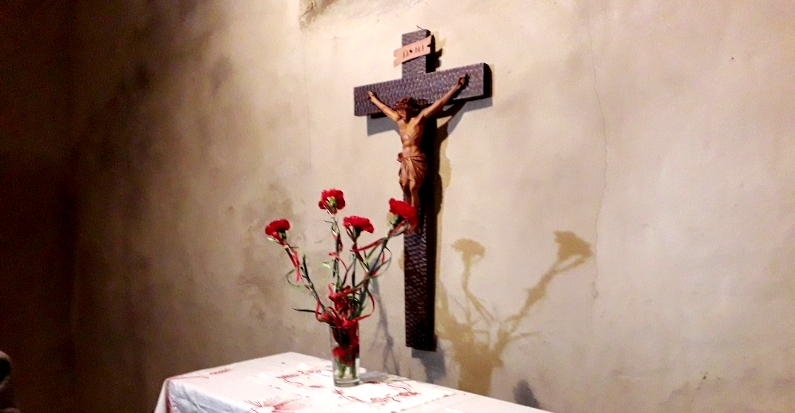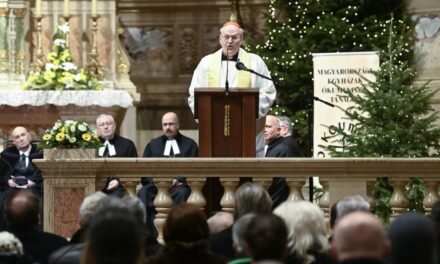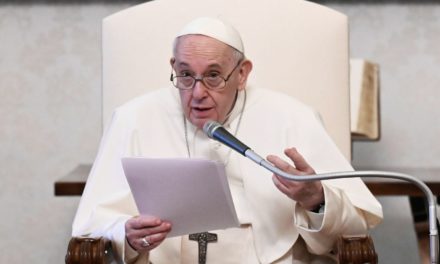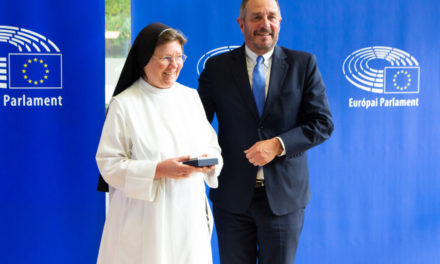The work of the Civil Justice Committee, founded by CÖF-CÖKA, basically involves the presentation of crimes committed during communism that have not yet been investigated and thus remained without consequences. The least explored area is the campaign against Christian priests, nuns, and even ordinary believers. The communists knew well that the community of religious people was the most dangerous for their anti-human utopia, so it is understandable that intimidation and even physical abuse "fit in" with their action against the clerical reaction. Zoltán Osztie's analysis reveals these crimes.
In the previous part of our series, the author also presented individual destinies. We will continue this now.
Reminiscences of Ilona M. Szappanos
When I wrote about our sister Ilona M. Király, I often used the plural. This is no accident: I was also interested in the matter of Ward College, along with several other enthusiastic students. We considered it very important that this institution survives, so that religious teachers are continuously trained. That is why we were ready for any sacrifice. Towards the middle of the sixties, only a small group remained and one teacher: dr. Kiss Csongor OFM. He was steadfast in teaching, even though he was summoned and reprimanded along with us. In 1961, a large wave of house searches swept through the Körtér area, which I also fell into. All my books and notes were taken, as they were from many other people.
The children's religious education continued in the meantime, because even though church religious education had improved a lot in the meantime, a significant number of parents did not dare to enroll their children. Despite this, these parents were heroes, as illegal religious education also threatened their existence. It was important for them that their children grow in faith and religious knowledge. I think of these families with great gratitude and respect, most of whom I still have an intimate relationship with. what was the special resource that kept us in God's service during the past forty years Without thinking, I answered that it was an example of Christian families who took risks for their faith. What a shame it would have been for us to back down, who were called to this by the Lord!
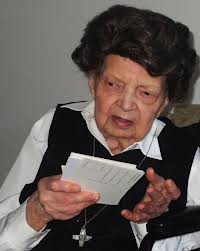
Sister Ilona M. Szappanos
In addition to studying religious education and theology, I had a task within the monastery. In 1951, our provincial superior assigned me to deal with the young people who were candidates for monks at the time of the dispersion. They just got a taste of the monastic life, but they could not continue it. Several of them really wanted to do this, and new ones also came forward, who wanted to become monks despite all state prohibitions and manipulations.
A special life in the catacombs thus began. We had a great role model: our founder, Mária Ward . The same life that he and his companions lived at the time of the foundation was repeated for us. We had a lot of hiding and changing apartments as part of our class. We met in the depths of forests, on waterfronts, and practiced spirituality at resorts. The explanation of the rules and constitution took place in small rooms, but it never stopped. Dressing ceremonies and vows took place in private homes, which were preferably performed by a Jesuit father. We respectfully remember P. Papp SJ as our master of ceremonies.
No matter how carefully and modestly we lived, we did not escape the ÁVÓ's jurisdiction, in fact! They accompanied us as if we had become acquaintances. Sometimes they even called me. I remember when I had a listening device installed under the name of "electrical repair". Other times they stood for a long time under the window, even if there were only two or three of us together. House inspectors were interrogated and transparent "build-ins" were used. It was like we were caught in a ring. There was no way out, and we didn't even look for one.
On December 12, 1967, all the young sisters and some other persons close to us were searched, approx. In 30 places - also with the head of the province. (Also at the workplace of one of our young brothers, at a university clinic.) Then in the morning they arrested me and took me away.
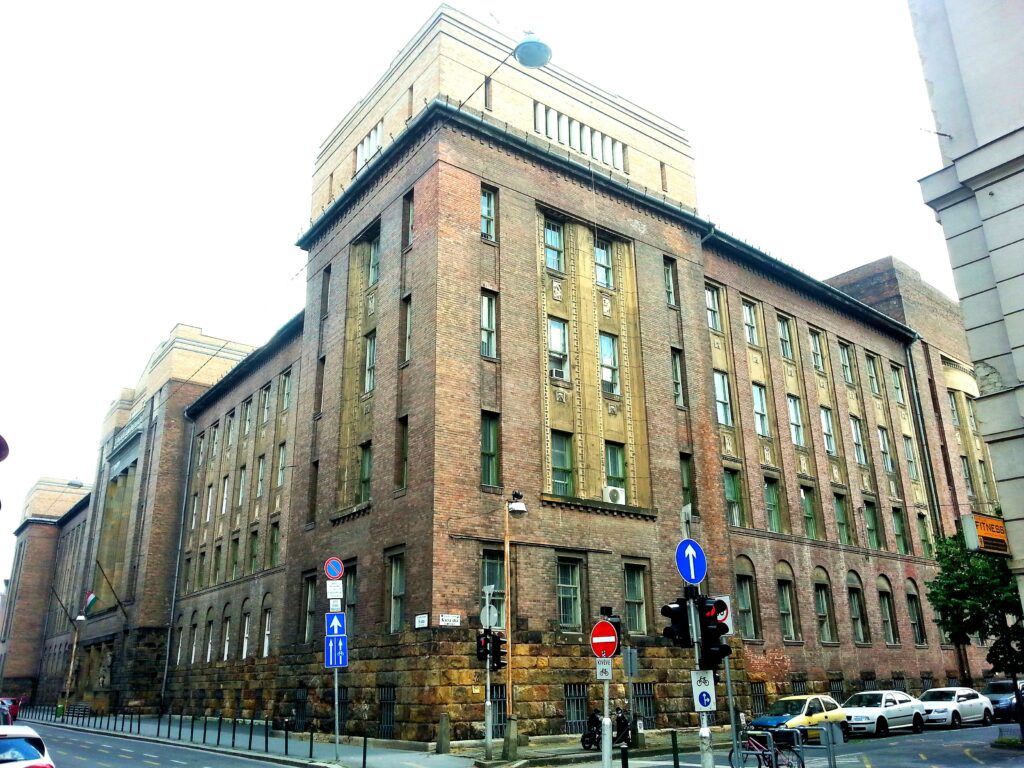
Gyorskogsi street, BV building (image source: Wikipedia)
Fő utca, Gyorkogsi utca, Markó, Mosoni út, Tököl. In a short time, I acquired so much "local knowledge". The interrogations took place in Fő utca, for sixty days, day and night. Much has been written about prison life. Everyone experiences this period individually, and what they experience there is stored in their cells. Perhaps I would mention what was more difficult than average and what brought inner joy. I think the interrogations were the most unpleasant for everyone, for me too , because one is constantly afraid of unnecessarily involving anyone in the case. The words of the scripture were always in front of me: "When you are brought to court, do not be afraid of how and what to say. In that hour you will know what to say, since it was not you who spoke, but the Spirit of your Father speaking from you." (Matthew 10:19-20). These words gave me a lot of strength.
It also meant strength, or rather joy, when the phone rang during the interrogation. The nine-year-old daughter of the interrogating officer regularly called her father, and the sweet child's voice came out of the device.
It was hard to bear a cellmate who was so-called it was "built on" with the mandate to extract various church matters from me. As his efforts were unsuccessful, he was constantly addressed with angry and insulting words. It was difficult in the restricted cell, at minus 10-15 degrees for two weeks with an open window, and immediately after that for two weeks in a windowless cell, in which a little air only flowed in when the guard opened the small spy window. Meanwhile, my partner was constantly smoking.
A small joy was a few grains of sugar that a guard gave me one Sunday afternoon. The same young man also lent me a small nail clipper for a quarter of an hour, which was a very big risk on his part - and an incomparable gift for me. It was a special joy when, in the spring, one of the cellmates, who went out to help in the office, brought a bunch of hyacinths in his pocket. Everyone was refreshed by the sight and smell.
It was a great experience when, before my release, I spent a night in a separate room with a repentant murderer in the prison hospital in Tököl. Maybe a few words about that. The person was mentally ill and was brought from the Kozma utca mental observatory to the prison hospital in Tököl for internal medicine treatment. The nurse warned the patients in advance not to talk about children in front of her, because years ago she killed her four-year-old child in a faulty state of mind. Of course, the conversation did not stop, since the main topic of conversation for women separated from their families is the child. As a result, the patient had a fit of rage and threw the stone slab of the bedside table. Everyone would have fled, but the door was locked. After calming him down, the ward doctor asked who would agree to go to a separate room with him. That's how we spent a night together. The unfortunate man said that he could not rest until he could confess what he had done. He had already asked the management, but they sent him a fake priest, and he sensed it. Then we prayed through the night, and in the morning he was quite calm when he was taken away.
I constantly experienced the power of prayer. Hours often seemed like minutes. Saint Paul meant a lot. Every night I waited to see which of his thoughts came to my mind first and the next day I lived from that. "I wear my shackles for Christ."
(Phil 1,14) "Grace has come to me to proclaim the unfathomable riches of Christ among the Gentiles." (Eph 3:8) etc. My environment was certainly a bit "pagan". At that time I was the only political prisoner among women: my fellow prisoners were put there for a completely different reason. (The reason was mainly prostitution). I felt very sorry for them. They took a liking to me, and I begged for them a lot, especially for the very young ones.
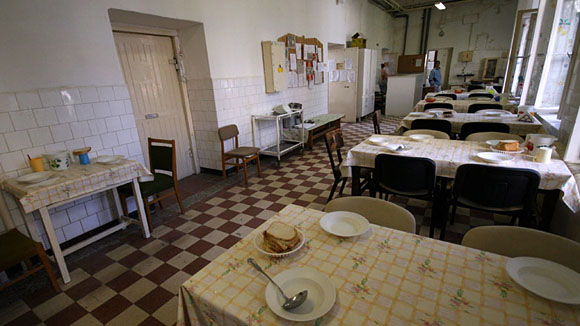
Judicial Observation and Mental Healing Institute (image source: Origo)
Taken as a whole, it was profoundly difficult to live in that milieu to which so much blood, so much torture, hatred, revenge, stupidity and lies were attached. Many times I was crushed by this consciousness.
It was hard to think about my brothers and friends who were constantly harassed as I read the minutes that contained their interrogations. I always felt that it was even more difficult for them in the crossfire of threats, subpoenas, and surveillance. However, the awareness of our spiritual unity made me happy. This spiritual unity - with almost all of the people involved - was preserved and strengthened even after my release - although there were still difficult years following God's permission.
Mária Ward and the members of the first order helped us and begged for us. I would like to mention Klára M. Melania Mezei , a sister named after the Divine Redeemer, who has been with us since she was a young university student, through thick and thin, through thick and thin.
We were nervous about the exams together and he tirelessly typed the notes. We went through 56 with him, the interrogations, house searches. The words of Scripture fit us: "One heart, one soul, since our vocation also speaks of one hope." (Acts 3:5) And another word of thanks to the National Nerve-Mind Hospital, where I was able to study for three years while working and obtain a professional nursing certificate. I was fifty years old then. As well as the SOTE Psychiatric Clinic, where I was able to spend more than twenty years at the service of patients. These were wonderfully beautiful years. Many names - of doctors, nurses, patients - swirl in my head, from whom I received lasting values. They were excellent personalities, set the best example and are still my friends today. See you up there!
Sister Mária Zipszer
Shortly before her death, which was unexpected, our brother Mária wrote her short biography, perhaps on inner inspiration.
In 1947, I entered the institute for English ladies in Veszprém. Mater Peller M. Anna was the headmistress at the time. Before that, she was a tutor for candidates and juniors, young sisters who had graduated from the novitiate, in our monastery in Budapest. The spiritual life and personality development of many were determined for life by his work as an educator and his valuable teachings. When I entered, I was a student at the commercial school called "Countess Zichy-Pallanicini", which I had already completed in the four-year commercial course for English ladies. On August 22, 1949, I got dressed and started the novitiate with my companions, in which we could unfortunately spend only eight months, because the dissolution of the orders was imminent.
In October 1956, I was also captivated by the desire and possibility of "freedom". Veszprém, the ancient Árpád-era city, also moved and burned with desire. We marched along the roads in a torchlight procession. We knew that they do the same in Győr, Miskolc, several big cities and especially in Budapest. We heard what was happening on Széna Square, Körter Square, VIII. and the IX. district. I was one of the youngest employees. I listened to the radio, passed on the news, organized for freedom. We didn't hurt anyone either by word or deed. In fact, we protected those in need. Intoxicated with joy, we lived "with one heart and soul" for ten days. Veszprém was one of the focal points of the revolution and of a unique combination.
He was arrested on March 1, 1957. The authorities took me first to the police station and then to the city jail, along with several of my companions. I don't need to brush off the treatment. After about three weeks, we were transported to the forced labor camp in Kistarcsa. Politicians and members of the public were closely together there - eighty, even a hundred of us - in one room. Prostitute women and girls were my direct companions. I knew very well that the Master addressed the Samaritan woman. Thus, when I met one or the other of them much later on the streets of Pest, I was able to hug them with love. I was only in Kistarcsa until the end of June 1957. This relatively short time was enough of an experience. My mother welcomed me and I eventually managed to get an advanced accountancy qualification and get a job accordingly. I was under police surveillance for a long time, but after that they stopped harassing me. They never wanted to recruit. I continued my monastic life in silence, became and remained a member of the order with eternal vows. With my chronic diabetes, my body keeps the vicissitudes it has experienced, but "ad majorem Dei gloriam".
Author: Zoltán Osztie
(Cover image source: Szepesikor)
Father Zoltán Osztie's full study can be read here: Zoltán Osztie - Persecution of Christians in Hungary

